- info@chinaadventure.org
- 86-18008011324
- Search
Regarding what the when is chinese new year 2025?, it can be determined as follows based on public information:
The date is: Wednesday, January 29, 2025
Lunar calendar: This day is the first day of the first lunar month, marking the beginning of the Lunar New Year
According to the lunar calendar, the zodiac sign of the Chinese New Year in 2025 is Earth Snake.
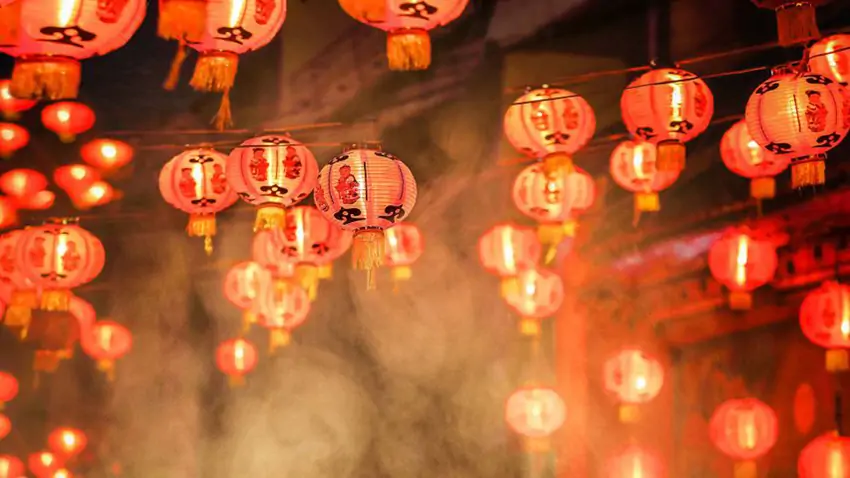
Welcome happiness and auspiciousness on the "New Year's Eve"!
New Year's Eve, also known as "Sui Chu", means "get rid of the old year and replace the new year."
According to legend, there was a four-horned beast called "Xi" in ancient times. Every winter, it would go to nearby villages to find food and wreak havoc, and the residents were overwhelmed.
Later, a child named "Nian" said that "Xi" was afraid of red, and as long as the villagers hung red cloth outside the gate, it would not dare to enter.
On the evening of New Year's Eve, the child named "Nian" led "Xi" out alone. The villagers threw the "bamboo joints" they had just harvested into the fire, and the fire immediately made a crackling sound, scaring "Xi" away.
So every year on the 30th day of the twelfth lunar month, people would prepare firecrackers to drive away "Xi" and hang red objects at the door to get rid of "Xi".
In this way, "Xi" would not come again for the whole year, and happiness and auspiciousness would be welcomed.
New Year's Eve is a good day to say goodbye to the past. I hope you can "eliminate" all your inner troubles and encounter a smooth year.
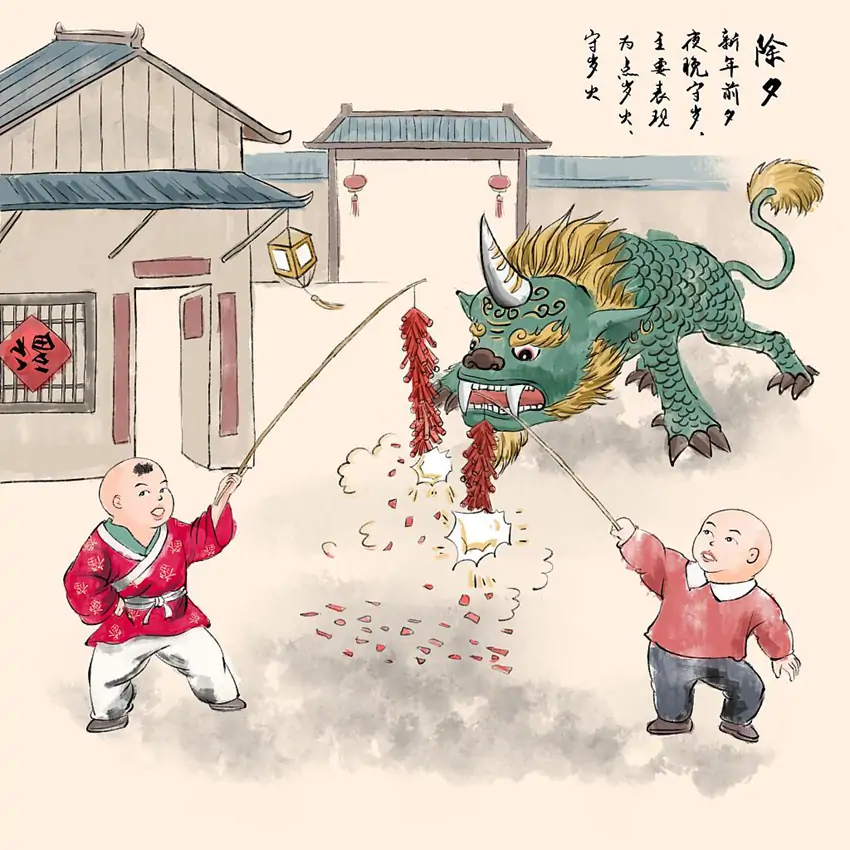
The Chinese New Year is always on the first day of the first lunar month, but the lunar calendar is different from the Gregorian calendar, so the Chinese New Year is on a different date every year in the Gregorian calendar.
The Spring Festival, also known as the Lunar New Year, is the New Year in the traditional Chinese calendar. The exact date of the ancient Spring Festival was the beginning of spring, which is around February 4th every year. The modern Spring Festival is calculated according to the lunar calendar, which is the first day of the first lunar month every year. Although there are differences in time, the cultural connotations and celebration methods of the two festivals have many similarities.
Why are the ancient and modern Spring Festivals not on the same day? This has to start with the calendar reform. In Chinese history, many calendars have been used, including the Sifen calendar, Taichu calendar, Daming calendar, and the Yuan Dynasty's Shoushi calendar. As time went on, the calendar gradually became complicated and the calculations became cumbersome. For convenience, during the Qing Dynasty, Emperor Kangxi ordered a calendar reform to merge the Lunar New Year with the Beginning of Spring, and the modern Spring Festival was officially born.
Although the calendar reform combined the Spring Festival and the Beginning of Spring into one, in fact, the meanings and celebrations of the two festivals are still different. In ancient times, the Spring Festival was a festival to pray for a good harvest and worship ancestors. People would hold various sacrificial activities, such as burning incense, offering sacrifices, and worshiping ancestors. The modern Spring Festival pays more attention to family reunions and entertainment activities, such as posting Spring Festival couplets, setting off firecrackers, eating reunion dinners, and watching the Spring Festival Gala.
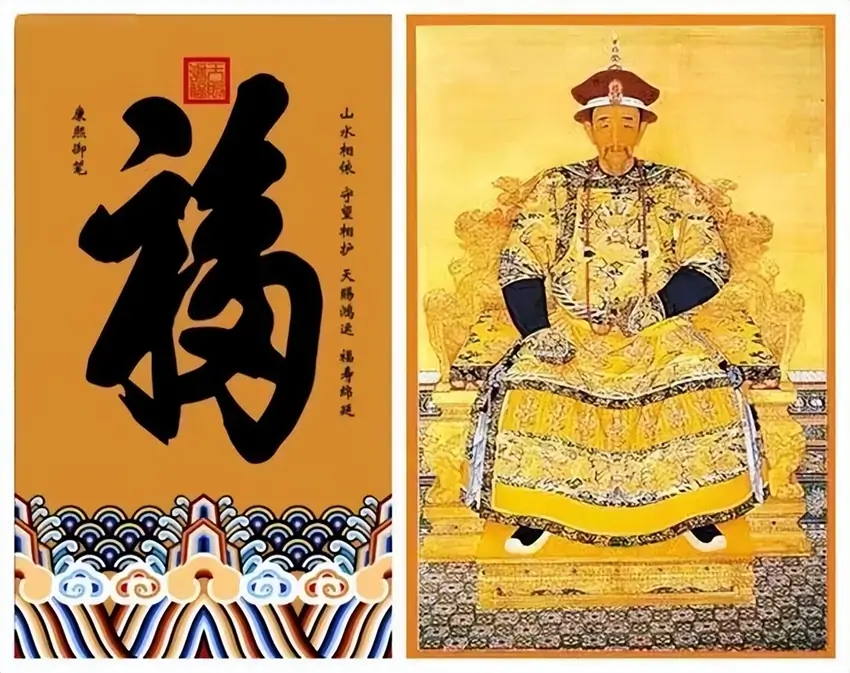
The specific arrangements for the holiday and adjustment dates for New Year's Day, Spring Festival, Qingming Festival, Labor Day, Dragon Boat Festival, Mid-Autumn Festival and National Day in 2025 are as follows.
1. New Year's Day: 1 day holiday on January 1 (Wednesday), no adjustment.
2. Spring Festival: 8 days holiday from January 28 (Lunar New Year's Eve, Tuesday) to February 4 (Lunar New Year's Day, Tuesday). Work on January 26 (Sunday) and February 8 (Saturday).
3. Qingming Festival: 3 days holiday from April 4 (Friday) to April 6 (Sunday).
4. Labor Day: 5 days holiday from May 1 (Thursday) to May 5 (Monday). Work on April 27 (Sunday).
5. Dragon Boat Festival: 3 days holiday from May 31 (Saturday) to June 2 (Monday).
6. National Day and Mid-Autumn Festival: October 1 (Wednesday) to 8 (Wednesday) are holidays, a total of 8 days. September 28 (Sunday) and October 11 (Saturday) are work days.
Lunar New Year celebrations usually last for 16 days. Each day of this 16-day festival has a name and usually a purpose or meaning. Here are all the important dates and their meanings
❖ Pasting Spring Festival Couplets
Spring Festival couplets, also known as "Spring Stickers", "Door Couplets", and "Couplet", are an important symbol of the Spring Festival. When people paste Spring Festival couplets and "Fu" on their doorsteps, it means that the Spring Festival has officially begun. During the Spring Festival, whether in cities or rural areas, in addition to Spring Festival couplets, every household also pastes window decorations, New Year paintings, and "Fu" characters to increase the festive atmosphere.
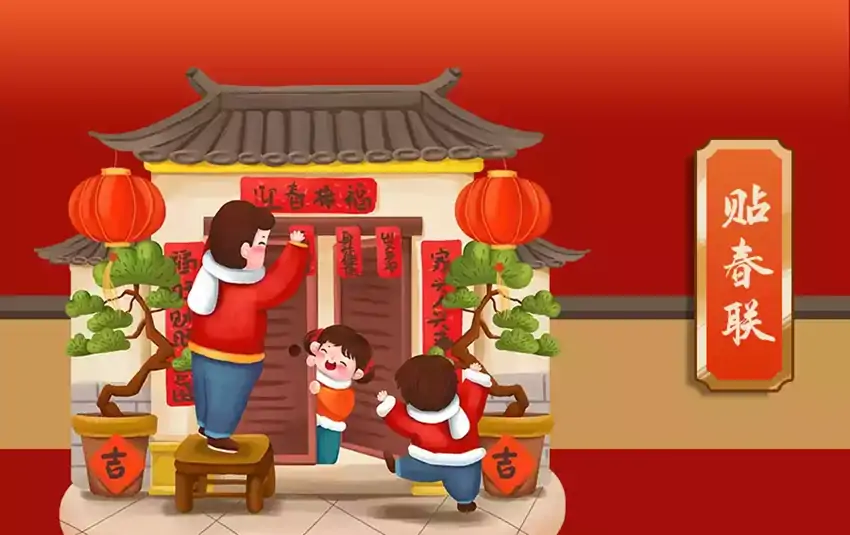
❖ New Year's Eve Dinner
New Year's Eve dinner, also known as New Year's dinner, reunion dinner, reunion dinner, etc., specifically refers to the family dinner on New Year's Eve at the end of the year. The reunion dinner is the highlight of the year before the New Year. It is not only colorful, but also very particular about the meaning. The table usually has chicken (meaning there is a plan) and fish (meaning there will be more every year) for good luck. The Chinese New Year's Eve dinner is a family reunion dinner. It is the most abundant and important dinner at the end of the year.
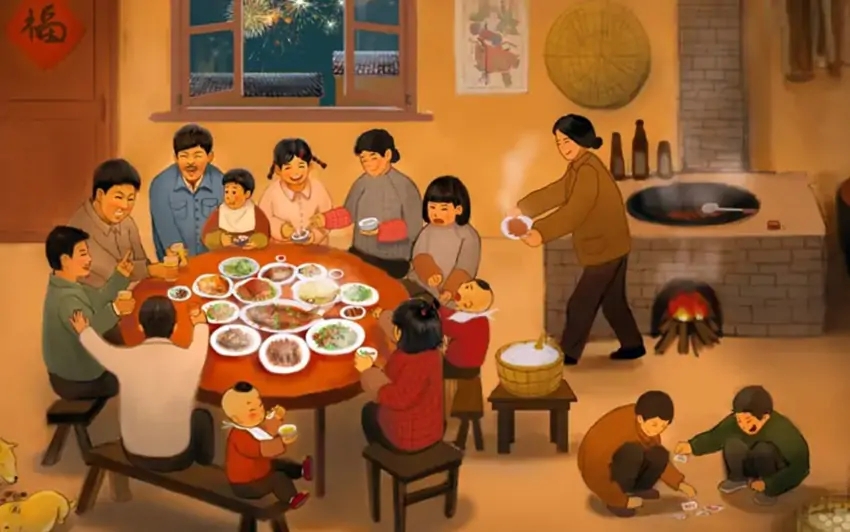
❖Shou Sui
Shou Sui is also known as Zhao Xu Hua, Dining Sui Huo, Staying Up All Night, etc. The folk custom of staying up all night is to keep the lights on all night on New Year's Eve. Staying up all night is called "lighting the lights and shining the year", that is, lighting candles all over New Year's Eve. It is said that after lighting them in this way, the family will be rich in the coming year. Staying up all night also means that the family reunites on New Year's Eve and stays up all night to welcome the arrival of the Lunar New Year.
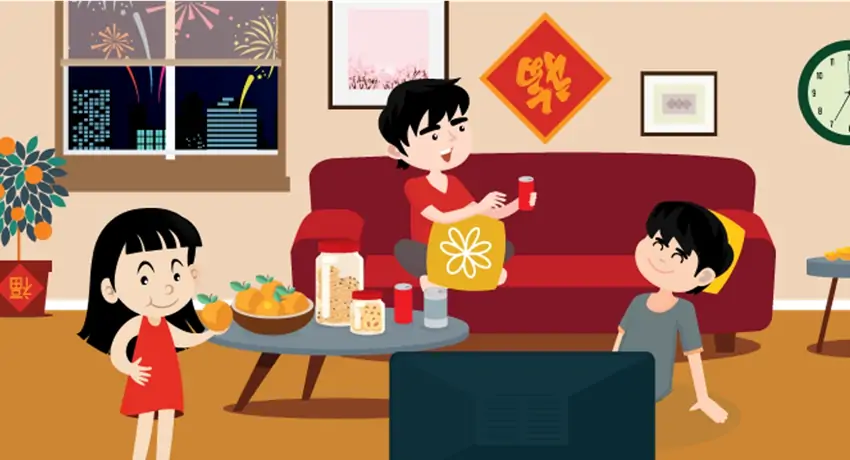
❖Setting off firecrackers
Setting off firecrackers is one of the traditional New Year customs. It is said that firecrackers originated from firecrackers. This custom has a history of more than 2,000 years in China. Nowadays, whether it is the New Year or festivals, or getting married, going to school and getting promoted, etc., as long as it is to express joy, people are used to setting off firecrackers to celebrate.
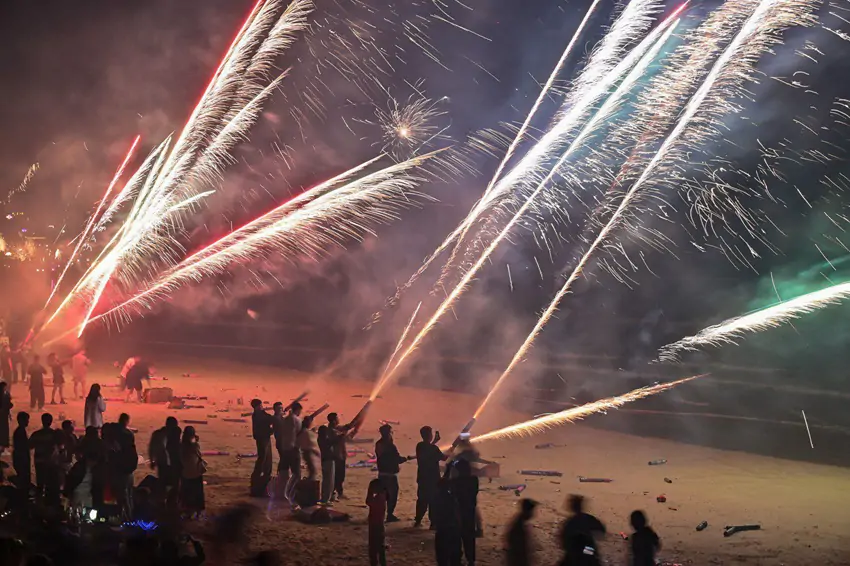
❖ Lucky money
After the New Year's Eve dinner, the elders will distribute the lucky money prepared in advance to the younger generations. Lucky money means "lucky money for the New Year", which conveys the elders' good wishes for the growth of children.
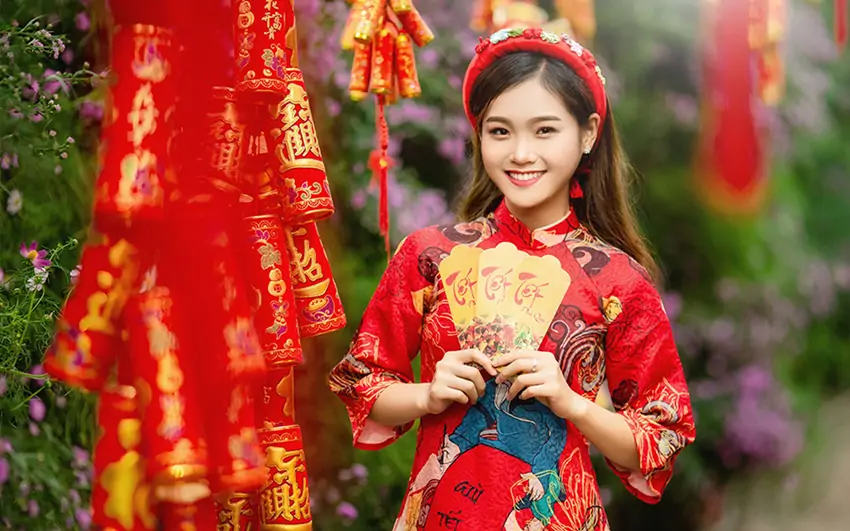
❖ Making dumplings
Dumplings are eaten on many traditional festivals in my country. Making dumplings on New Year's Eve has a different meaning from usual days. Whoever eats the dumplings with coins inside will have good luck in the new year, which is auspicious.
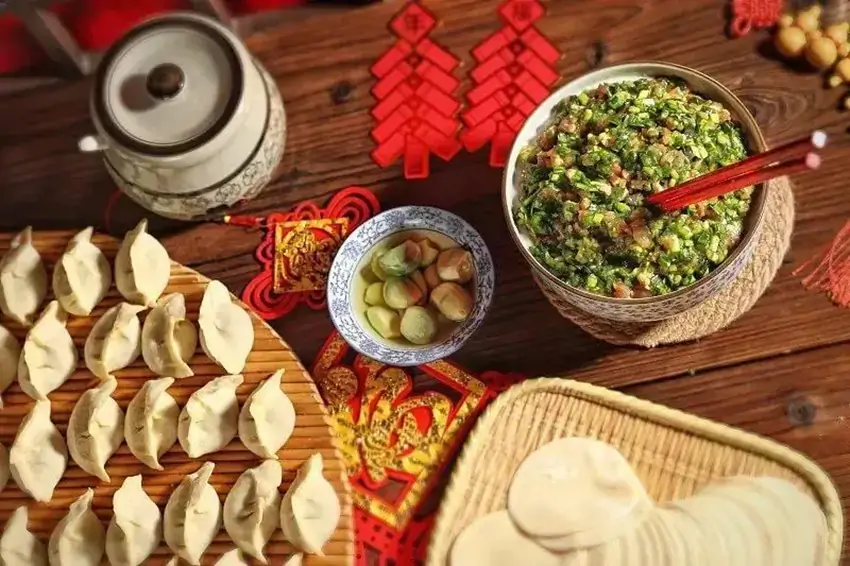
Clean the house before New Year's Eve. On New Year's Day, you cannot use a broom or take out the garbage. Prepare a large bucket for waste water and do not spill it on that day.
You cannot break furniture during the New Year. If you break it, you must quickly say "Happy New Year" or "May you be rich and prosperous".
On the first day of the New Year, you should greet your elders or neighbors. Generally, you do not travel far to greet them. After staying up all night on New Year's Eve, people open the door and greet each other in the morning of the first day of the New Year with "Happy New Year! Peace and good luck". The younger generation pays New Year's greetings to the elders, and the elders give New Year's money to suppress evil spirits.
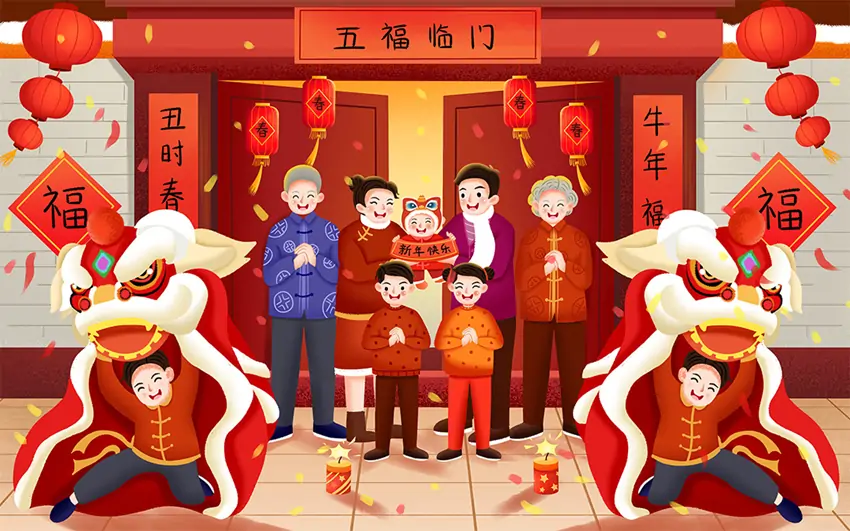
On this day, the married daughter must take her son-in-law to her mother's home, and the gifts she brings must be in pairs. The mother's family cannot accept all the gifts, and when she returns to her husband's home, she must bring some back. The daughter who returns to her mother's home must bring some gifts and red envelopes to share with the children of her mother's family.
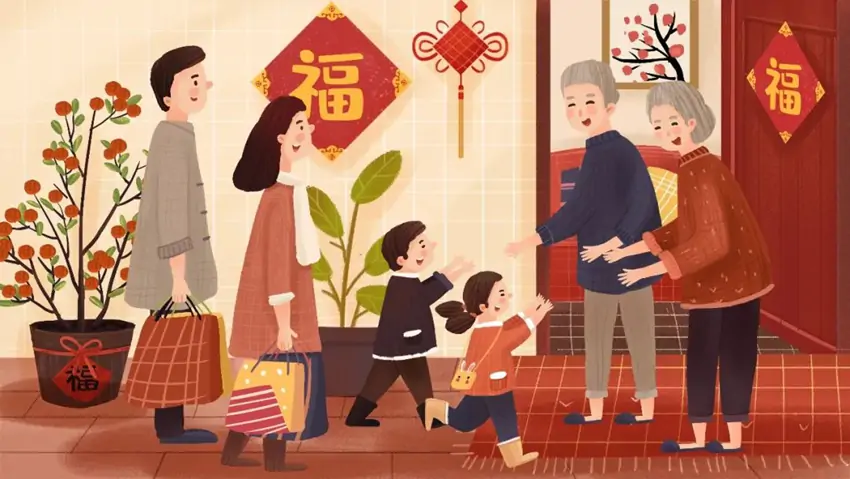
In traditional customs, the third day of the Lunar New Year is considered to be the day when mice marry their daughters, so you must go to bed early at night and not disturb the mice marrying their daughters.
The mouse has the flavor of "Whoever doesn't let me have a good day, I will make him uncomfortable for the whole year". If you disturb the mouse marrying his daughter, the mouse will bring disaster to the family.
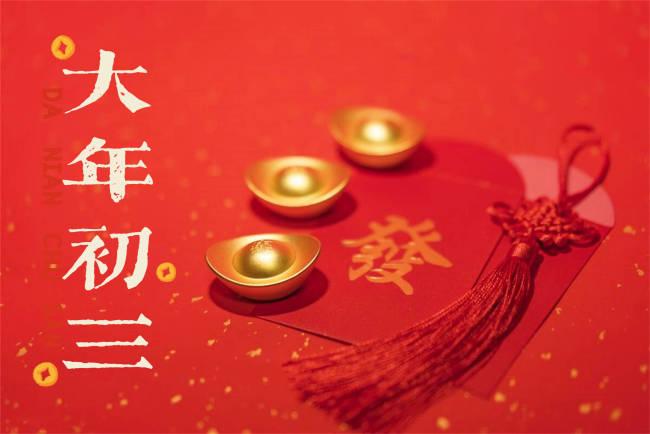
According to folk sayings, the Kitchen God will check the household registration on the fourth day of the first lunar month, so every household must stay at home, prepare rich fruits, burn incense, light candles and set off firecrackers to welcome him. Chen Jing said that although many folk sayings have no basis, they themselves carry people's good wishes to pray for blessings and avoid disasters, which is why they can be passed down.
They also need to mix the leftover meals of the past few days together and clean up the New Year's goods. Dust the room, sweep the floor, and pile the garbage in the yard to prepare to "get rid of poverty".
The fifth day of the Lunar New Year is commonly known as Po Wu, and it is necessary to "drive away the five poors", including "poor wisdom, poor learning, poor literature, poor life, and poor relationships". People get up at dawn, set off firecrackers, and clean up. Firecrackers are set off from inside to outside, while walking out the door. It is said that all unlucky things are driven out. On this day, the popular folk custom is to eat dumplings, commonly known as "pinching the villain's mouth".
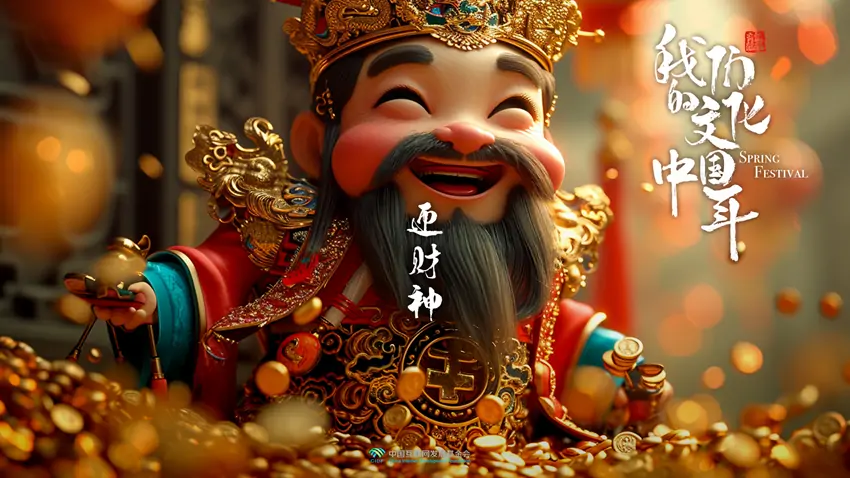
The God of Wealth was just welcomed into the house on the fifth day, and the God of Poverty must be sent away on the sixth day. On the day of sending away the God of Poverty, a thorough cleaning should be carried out at home, and all the garbage swept out, as well as useless rags, etc. should be thrown away.
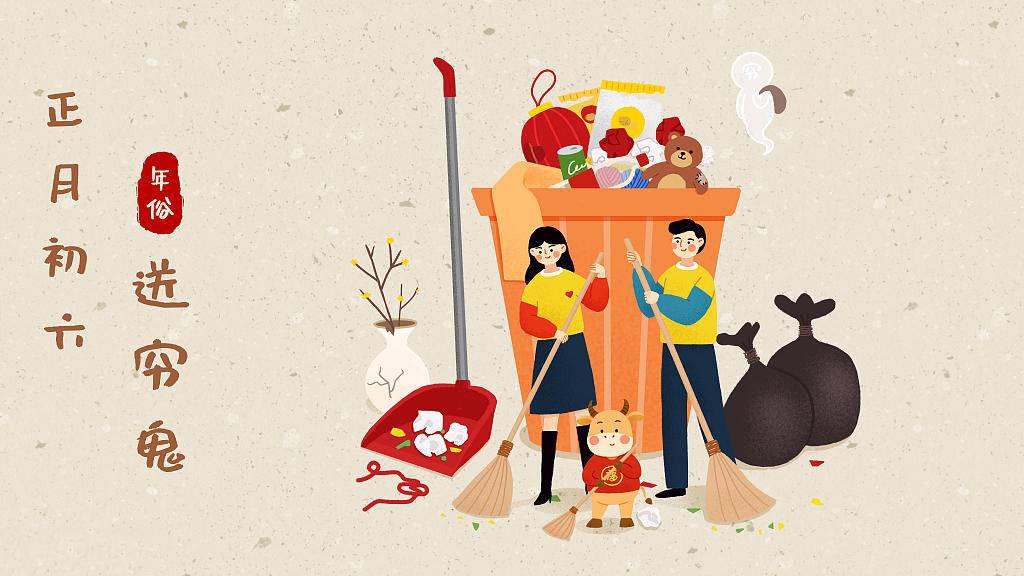
Also known as “Human Victory Festival” and “Human Seventh Day”. Legend has it that when Nuwa first created the world, she created animals such as chickens, dogs, pigs, cows and horses, and then created humans on the seventh day, so this day is the birthday of mankind. Parents cannot teach their children on this day.
The eighth day of the first lunar month is the day when the stars descend to the earth. Small lights are made and burned to worship them, which is called Shunxing, also known as “worshiping stars” and “receiving stars”. It is also said that the eighth day is the birthday of millet. If the weather is clear on this day, it means a good harvest of rice on this day, and if the weather is cloudy, it means a poor harvest.
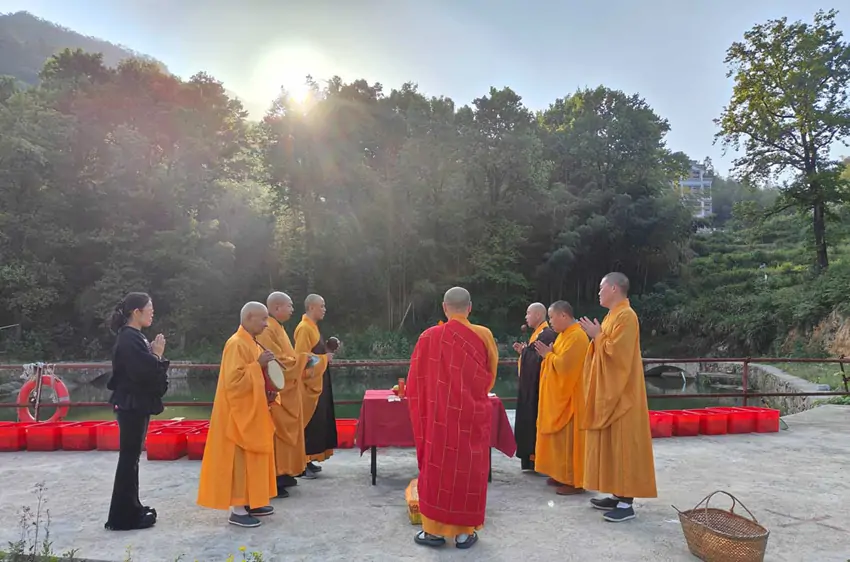
The ninth day of the first lunar month is the day of the sky, commonly known as “the birthday of the God of Heaven”. Legend has it that this day is the birthday of the Jade Emperor. The main customs include worshiping the Jade Emperor, fasting the sky in Taoist temples, etc. In some places, during the day of the sky, women prepare fragrant flowers, candles, and fasting bowls, and place them in the open air at the entrance of the courtyard and alley to worship the sky and ask for blessings from the God of Heaven.
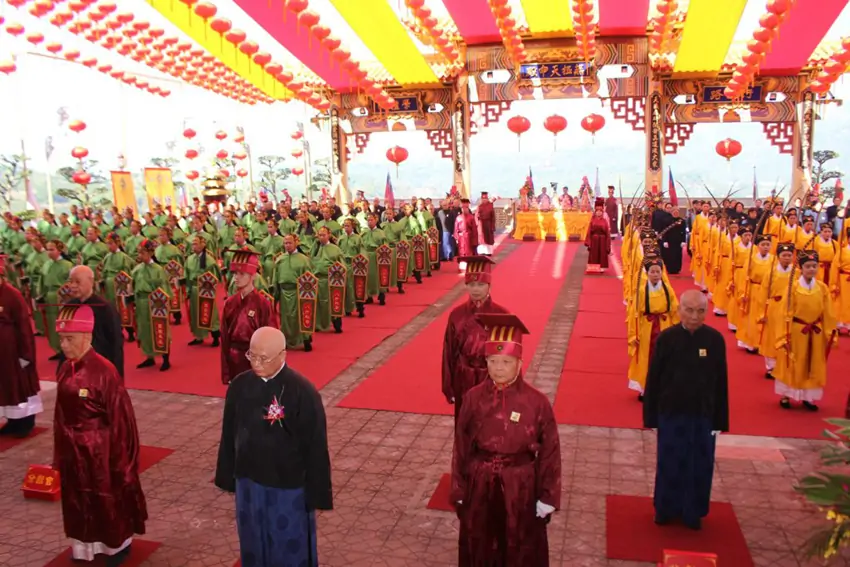
On this day, all stone tools such as grinding and milling cannot be moved, and even offering sacrifices to stones may damage crops. It is also called "stone does not move" and "ten does not move".
In most parts of China, everything on the fourteenth day is for the Lantern Festival the next day. On this day, the lantern festival is officially open for citizens to buy lanterns.
Eating Lantern Festival on the fifteenth day of the first lunar month, "Lantern Festival" as a food has a long history in China. In the Song Dynasty, a novel food eaten during the Lantern Festival was popular among the people. This food was first called "Floating Yuanzi" and later called "Lantern Festival", and businessmen also called it "Yuanbao".
Lantern Festival is "tangyuan", which is filled with white sugar, rose, sesame, bean paste, yellow osmanthus, walnut kernels, nuts, jujube paste, etc., and is wrapped in glutinous rice flour into a round shape. It can be meat or vegetarian, with different flavors. It can be boiled in soup, fried, or steamed, which means reunion and happiness.
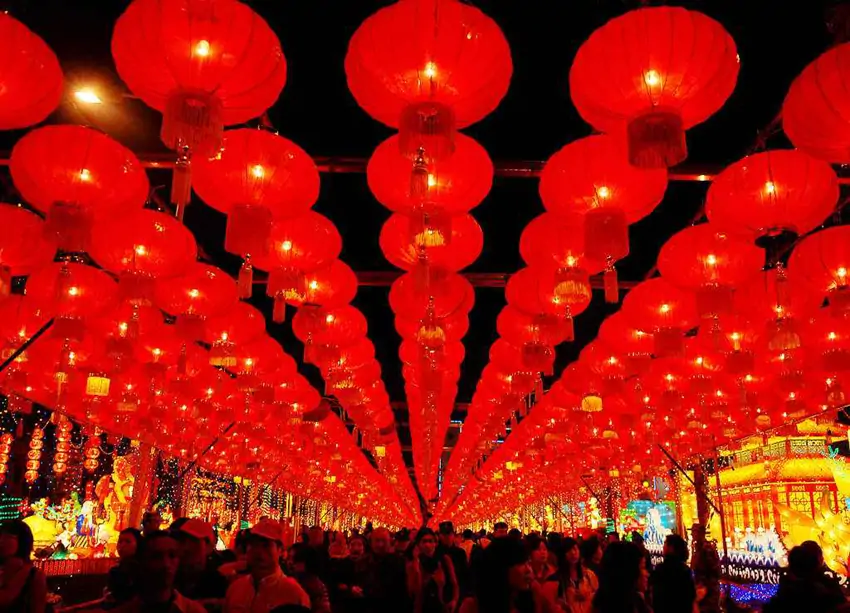
New China Xinjiang Silkroad Luxury PandaTrain is available to book now!
Does The Orient Express Go To China?
How to Buy SIM Card in China for Foreign Travelers?
we’ll reply you in 24 hours!
Copyright © 2012-2024 All Rights Reserved to chinaadventure.org